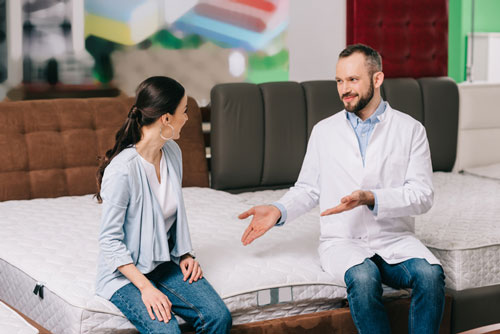Your bed is supposed to be a safe haven. Most of us spend a third of our lives there. Restorative sleep keeps your mind sharp and your body strong.
But new research shows that many of us are sleeping on a mattress that may be harming our health.
Chemicals called volatile organic compounds (VOCs) are the problem.
Mattresses have long been known to emit them in gaseous form. The VOCs come from polyurethane, flame retardants, and plastics inside mattresses.
In a study published in the journal Environmental Science & Technology, researchers looked at how VOCs are released when you lie on a mattress.[1]
The scientists chose eight different polyurethane mattresses. They first aired them out for at least six months.
“Often, we think, if you let something air out for a little while, you can dramatically reduce the level of chemicals that are off-gassed,” said study co-author Professor Sarah Evans.
But the results showed otherwise.
The research team subjected the mattresses to the body heat, humidity, and carbon dioxide that humans exude while sleeping. The mattresses emitted higher levels of VOCs than they did when not in use.
VOCs are linked to liver and kidney damage, as well as cancer. They can cause eye, nose, and throat irritation and headaches.
VOCs were found to come out of mattresses at levels high enough to be dangerous to babies and small children, according to government standards. They are supposed to be less risky for adults. But do you really want to take the chance?[2] [3]
What to Look for When Choosing a Mattress
The Environmental Working Group is a nonprofit consumer organization. They recommend mattresses that have :[4]
- Low VOC certification. It should be labeled as such.
- No less than 95% certified organic content. That includes cotton, wool, or natural latex.
- No polyurethane foam.
- No added chemical flame retardants.
- No added fragrances or antimicrobials.
- No PVC or vinyl.
Look for Global Organic Textile Standard (GOTS) certification. It rules out most if not all of the unwanted chemicals listed above.
Go HERE for a list of brands and types of organic mattresses.
Editor’s Note: Are you concerned that you’re not getting straight answers about your health concerns? Read Independent Healing… It’s your best source for unbiased, evidence-based medical information.
CLICK HERE to subscribe.
Related Articles
Sunscreen Chemicals Get Into Your Bloodstream… Here’s a Safer Alternative
Toxic Chemicals in Your Mac and Cheese
Why Many ‘Organic’ Restaurants Actually Aren’t
Like this Article? Forward this article here or Share on Facebook.
[1]https://www.ncbi.nlm.nih.gov/pubmed/31290311
[2]https://www.epa.gov/indoor-air-quality-iaq/volatile-organic-compounds-impact-indoor-air-quality
[3]https://consumer.healthday.com/environmental-health-information-12/chemical-health-news-730/is-your-mattress-releasing-toxins-while-you-sleep-748212.html
[4]https://www.ewg.org/healthyhomeguide/mattresses/

